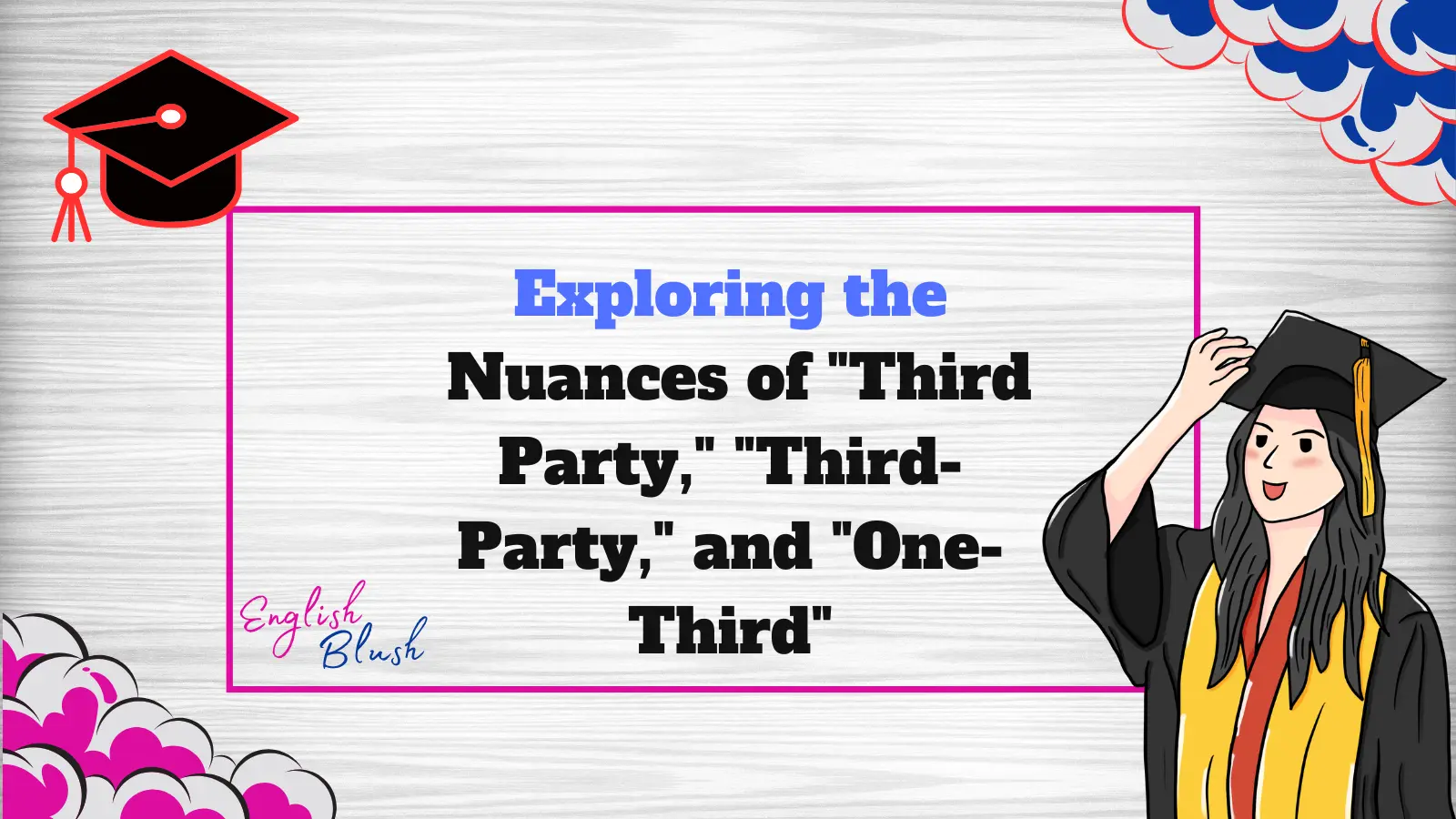The English language often presents us with words or phrases that can shift meaning based on punctuation and context. Terms like “third party,” “third-party,” “one third,” and “one-third” are excellent examples of how slight changes in form influence their role in a sentence. In this article, we will explore their correct usage as a noun, adjective, and even verb phrase. We will also look at common mistakes and provide guidance on following grammatical rules, including consistency between UK and US English.
Understanding “Third Party” vs. “Third-Party
“Third Party” as a Noun
The term “third party” as a noun refers to an entity separate from the two primary parties involved in a situation.
Correct Examples:
- A third party mediated the dispute between the employees.
- We hired a third party to conduct an independent review.
Incorrect Examples:
- A third-party mediated the dispute between the employees.
- We hired a third-party to conduct an independent review.
In these sentences, using the hyphen incorrectly changes the meaning or creates grammatical confusion. A noun phrase does not need a hyphen.
“Third-Party” as an Adjective
When used as an adjective, “third-party” describes something related to an independent or external entity. The hyphen connects the two words to modify the noun together.
Correct Examples:
- The company uses a third-party vendor for its payroll system.
- We purchased third-party insurance to cover additional risks.
Incorrect Examples:
- The company uses a third party vendor for its payroll system.
- We purchased third party insurance to cover additional risks.
The omission of the hyphen fails to show that “third” and “party” function as a single idea modifying the noun.
The Role of “One Third” and “One-Third”
“One Third” as a Verb Phrase
When referring to an action involving the fractional division of something, “one third” is often used as a phrase rather than a single compound noun.
Correct Examples:
- They decided to divide the land, giving one third to each sibling.
- She drank one third of the bottle before handing it back.
Incorrect Examples:
- They decided to divide the land, giving one-third to each sibling.
- She drank one-third of the bottle before handing it back.
Here, the unhyphenated phrase is appropriate, as it describes the proportion without acting as a modifier.
“One-Third” as an Adjective or Noun
When functioning as an adjective or noun, the hyphenated form “one-third” is required.
Correct Examples:
- A one-third majority was needed to pass the motion. (Adjective)
- One-third of the cake was missing from the plate. (Noun)
Incorrect Examples:
- A one third majority was needed to pass the motion.
- One third of the cake was missing from the plate.
Without the hyphen, the connection between “one” and “third” is unclear, leading to a potential misreading of the sentence.
Why Grammar Rules Matter
Clear communication depends on consistent grammar usage. Misplacing or omitting a hyphen may seem trivial, but it can significantly alter a sentence’s meaning or reduce readability. For instance:
- Incorrect: Third-party spoke to the client.
- Correct: The third party spoke to the client.
In the incorrect version, the hyphen incorrectly makes “third-party” an adjective without a noun to modify. This creates confusion for the reader.
UK vs. US English Consistency
Both UK and US English follow the same principles for hyphenating compound modifiers like “third-party” and fractions like “one-third.” These universal rules help maintain clarity and understanding across English-speaking regions.
Key Takeaway
- “Third Party” is a noun and does not require a hyphen.
- Use it to refer to an independent individual or group.
- Example: We consulted a third party to resolve the issue.
- “Third-Party” is an adjective and requires a hyphen.
- Use it to describe something associated with an external entity.
- Example: Third-party software was integrated into the system.
- “One Third” is a verb phrase and does not require a hyphen.
- Use it when describing an action or portion divided.
- Example: She drank one third of the water.
- “One-Third” is a hyphenated noun or adjective.
- Use it to describe fractions or modify a noun.
- Example: One-third of the participants left early.
By adhering to these rules, writers ensure their sentences are precise and professional. While the differences between these forms may appear subtle, they play a significant role in maintaining clear communication.
In conclusion, grammar and punctuation are not just arbitrary rules—they are tools for crafting clear and effective messages. Understanding when to hyphenate and when not to can make your writing much more accessible. Whether writing in UK or US English, consistency ensures your audience can easily grasp your intended meaning.





